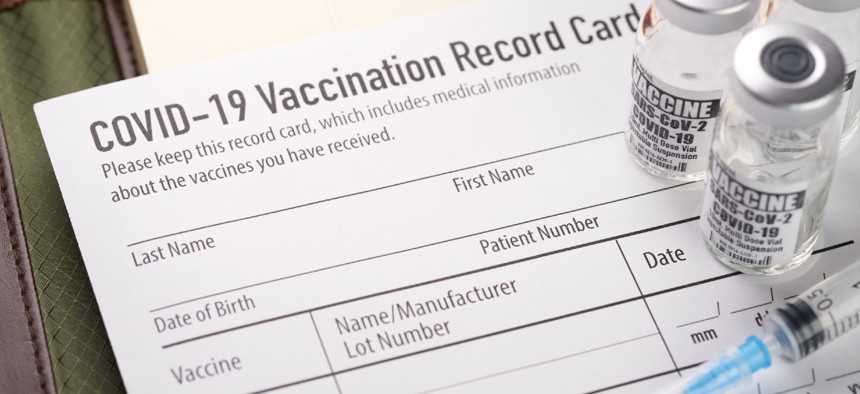
Bill Oxford / iStock.com
Coronavirus Roundup: Vaccine Rule for Private Sector Employers Coming Soon
There's a lot to keep track of. Here’s today’s list of news updates and stories you may have missed.
An advocacy arm of Goldman Sachs’ “10,000 Small Businesses” training program has launched a series of surveys to gain better insight into the challenges of small business owners. The project was in the works before the pandemic, but the pandemic “accelerated” its launch, Joe Wall, national director of the initiative, told Government Executive.
One survey––conducted by Babson College and David Binder Research of 1,145 participants in the 10,000 Small Businesses program between August 30 and September–– found 88% percent of small businesses that were awarded federal contracts were worried about inflation in the United States and 82% of those small business owners saw increases in their operational costs in the past six months. Also 56% of respondents said they did not think there was enough transparency about federal procurement opportunities and 79% said they do not think there is a level playing field for small businesses in trying to win federal contracts.
Representatives of the initiative sent a letter to Congress and the Biden administration last month suggesting procurement reforms to better help small businesses in federal contracting, particularly those that are women- and minority-owned and located in economically distressed areas. Here are some of the other recent headlines you might have missed.
Forty-percent of the General Services Administration's leases are set to expire over the next four years, which is a factor the agency will have to consider as it looks to shape the future of post-pandemic work, Federal News Network reported on Tuesday.
The Office of Management and Budget has finished its review of the vaccine emergency rule for private businesses with 100 or more employees and it will be official in a few days, CNN reported on Monday.
The administration’s Safer Federal Workforce Task Force released new guidance on Monday that says covered contractors should “determine the appropriate means of enforcement” for employees who do not get vaccinated and gave some suggestions for actions to take. Eric Hoplin, president and CEO of the National Association of Wholesaler-Distributors, who raised concerns last month about the deadline and supply chain disruption, said this “flexibility” is an “improvement.”
Ninety-seven percent of active-duty troops have received at least one vaccine dose, Pentagon Spokesman John Kirby said during a briefing on Monday. “This would include 99% of active-duty sailors, and with active airmen closely behind it, around 97%, and the Marine Corps is at 93% with one dose, and the Army also is in the 90th percentile,” he said. Kirby did not have any updates about changes to guidance to include booster shots. “I think the secretary's been very clear with the leaders of the military departments that he wants them to execute the mandate with a sense of compassion and understanding,” he added.
On Tuesday night, the Centers for Disease Control and Prevention endorsed the recommendation from its advisory committee that kids ages five to 11 get the Pfizer/BioNTech vaccine. “Distribution of pediatric vaccinations across the country started this week, with plans to scale up to full capacity starting the week of November 8th,” said the CDC in a statement. “Vaccines will be available at thousands of pediatric healthcare provider offices, pharmacies, Federally Qualified Health Centers, and more.”
Amb. Joan Polaschik, deputy director of the Foreign Service Institute, testified before a Senate committee on Tuesday that the pandemic “accelerated our use of technology in the classroom.” The institute, which provides training to U.S. diplomats and foreign service professionals, “shifted 575 of our 613 course offerings – 94% – into the virtual world.” Officials are now assessing lessons learned from that to see which classes should be hybrid or virtual going forward. Also, “during the pandemic, we’ve increased our enrollment in resilience and related workforce support offerings by 80% in one year (that includes an increase of over 10,000 participants) and shifted 95% of our services to the virtual environment,” said Polaschik. “We intend to keep the majority of our resilience offerings virtual even as pandemic conditions improve.”
The State Department made a “historic” effort to repatriate U.S. citizens and lawful permanent residents during the first six months of the pandemic; however, it should strengthen its readiness for future crises, the Government Accountability Office said in a report published on Tuesday. Despite acting quickly to help those who were abroad, the department didn’t “follow some of its policies and lacked guidance for certain aspects of its repatriation effort,” said the report. “For example, as of May 2021, an interagency group State established to coordinate plans to evacuate U.S. citizens abroad in emergencies had not met since April 2019, hampering interagency communication early in the crisis. Also, incomplete guidance for calculating and documenting actual costs of State-chartered flights led to missing or inconsistent documentation and limited State’s ability to show that the prices it charged passengers complied with its fare policy.”
While many enforcement activities at the Internal Revenue Service were not ready for telework before the pandemic, the managers realize the agency “needs to move from paper-based to more digital processes,” said a blog from GAO published on Tuesday. “Some of the new technologies and strategies that [the] IRS used to manage enforcement activities during the pandemic may stick around.”
Upcoming: The White House COVID-19 response team and public health officials will give a briefing at 1:15 p.m.
Help us understand the situation better. Are you a federal employee, contractor or military member with information, concerns, etc. about how your agency is handling the coronavirus? Email us at newstips@govexec.com.
NEXT STORY: Is It Time to Ditch Daylight Saving Time?







